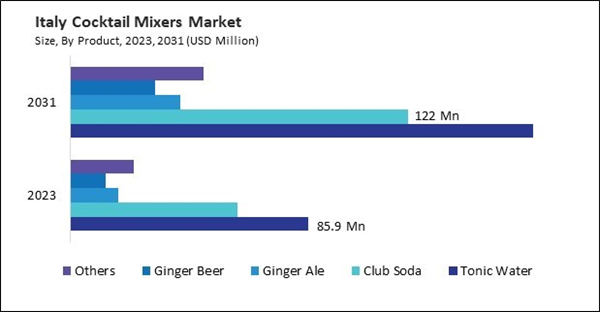The Germany market dominated the Europe Cocktail Mixers Market by Country in 2023, and would continue to be a dominant market till 2031; thereby, achieving a market value of $1,483.5 million by 2031. The UK market is exhibiting a CAGR of 6.4% during (2024 - 2031). Additionally, The France market would experience a CAGR of 8.1% during (2024 - 2031).
Over the past decade, there has been a notable shift in consumer behavior, with a rising number of individuals seeking unique and sophisticated drinking experiences. The millennial and Generation Z demographics exhibit a notable predilection for this trend, attracted to the artistic intricacies and innovative thinking that go into the production of cocktails. The proliferation of cocktail bars, speakeasies, and mixology classes has further fueled this interest, encouraging consumers to experiment with different flavors and ingredients. Consequently, there is a burgeoning demand for high-quality cocktail mixers that can replicate the bar experience in the comfort of one’s home.
The health and wellness trend has also made its mark on the cocktail mixers market. This has led to the development of mixers that use natural and organic ingredients, contain no artificial additives, and are low in sugar and calories. The demand for mixers that cater to specific health needs, such as low-alcohol or non-alcoholic options, is also rising. These products appeal to consumers who want to enjoy cocktails without compromising health. Incorporating functional ingredients, such as superfoods and botanicals, into mixers is another trend that aligns with the health and wellness movement.
Additionally, the premiumization trend was already apparent in the region before the pandemic, but it has significantly accelerated in recent times. Consumers are increasingly seeking premium spirits and cocktails to enhance their drinking experience, focusing on the taste and quality of their beverages. There is also a growing preference for longer drinks with lower alcohol content and cocktails made with natural ingredients. This trend towards mindful drinking existed before the pandemic and has only continued to grow, with a heightened demand for non-alcoholic and low-alcohol cocktails. Therefore, all these factors will aid in the growth of the market.
Based on Distribution Channel, the market is segmented into On-trade, and Off-trade. Based on Product, the market is segmented into Tonic Water, Club Soda, Ginger Ale, Ginger Beer, and Others. Based on Packaging Type, the market is segmented into 1L PET, Cans, Glass, 10oz., and Others. Based on countries, the market is segmented into Germany, UK, France, Russia, Spain, Italy, and Rest of Europe.
List of Key Companies Profiled
- Fever-Tree Drinks PLC
- The Coca Cola Company
- Keurig Dr Pepper, Inc.
- Britvic PLC
- Fentimans Ltd.
- White Rock Products Corporation
- Zevia, LLC
- Thomas Henry GmbH
- East Imperial Beverages Corporation
- PepsiCo, Inc.
Market Report Segmentation
By Distribution Channel- On-trade
- Off-trade
- Tonic Water
- Club Soda
- Ginger Ale
- Ginger Beer
- Others
- 1L PET
- Cans
- Glass
- 10oz.
- Others
- Germany
- UK
- France
- Russia
- Spain
- Italy
- Rest of Europe
Table of Contents
Companies Mentioned
- Fever-Tree Drinks PLC
- The Coca Cola Company
- Keurig Dr Pepper, Inc.
- Britvic PLC
- Fentimans Ltd.
- White Rock Products Corporation
- Zevia, LLC
- Thomas Henry GmbH
- East Imperial Beverages Corporation
- PepsiCo, Inc.









